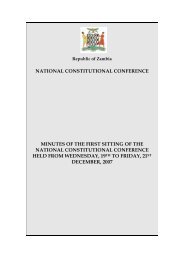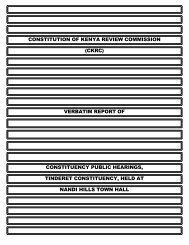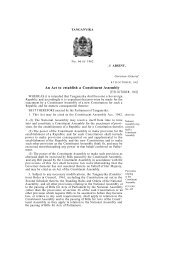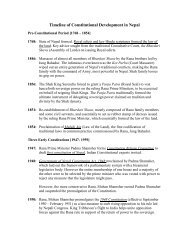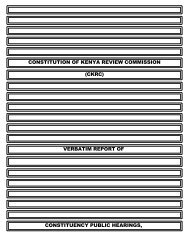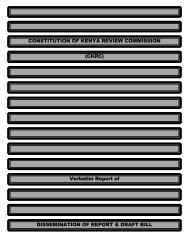verbatim report of - ConstitutionNet
verbatim report of - ConstitutionNet
verbatim report of - ConstitutionNet
Create successful ePaper yourself
Turn your PDF publications into a flip-book with our unique Google optimized e-Paper software.
On the issue <strong>of</strong> national schools I mean you mentioned quota system <strong>of</strong> education being abolished so that students get a chance<br />
to go to any other training shool they qualified for. That is a noble idea but the distribution <strong>of</strong> those good schools in itself is acute<br />
and they are alredy located on what is a key to a huge imbalance with some concentration in various areas and none in other<br />
areas. So would you stretch the quota system and leave it at that or you would go further and say you know the decentralisation<br />
<strong>of</strong> the good schools, centre, <strong>of</strong> excellence, so that as you send your kids from here to Mang'u, the Kiambu children are able to<br />
come here because there is an equivalent school in Emuhaya or Vihiga.<br />
And the issue <strong>of</strong> relocating industries to the drier areas, are you suggesting that, that should be done for all industries or you<br />
exclude agricultural industries? The reason being the cost <strong>of</strong> taking those raw materials as bulky as they are across long<br />
distances, how would you reconcile that? Because then the cost <strong>of</strong> production will be increased which then will be passed over<br />
to the consumers and then resulting into comercial agricultural products that are expencive and probably difficult for people to<br />
acquire.<br />
On the other hand, the so called arid and semi arid areas also might have resources. It is only that probably you have not been<br />
able to see them. For instance, 75% <strong>of</strong> the meat consumed in Kenya comes from Northern Kenya, that is stretch from Samburu<br />
up to Lamu, and there have been no industries to address that. You probably would like to think through stock taking,<br />
rationalisation, to see indeed what resources exists where, before even assuming that some areas are endowed and others are<br />
less endowed. But the key question is, how do you reconcile if you are to relocate agricultural industries, the cost <strong>of</strong> production<br />
shooting up?<br />
J . J Bokachi: Now I don’t see the cost <strong>of</strong> production shooting up because the very very manufactured goods in Nairobi are<br />
still bought to the North Eastern Province and so what I am trying to propose here is lets look at the Japanese kind <strong>of</strong> system<br />
whereby you have particular cities known for industrial work and as you may discover that Nairobi is a slum city and infact we<br />
are not proud as Kenyans to have Nairobi as our capital city because it doesn’t bring out the image other cities bring out. For<br />
example if we took all this manufacturing firms, companies, factories, and we relocate them in Northern Eastern, Eastern<br />
province, it means we are going to have a very big exodus from Nairobi to the North Eastern province. What’s going to happen<br />
now. These people as they come, they are going to promote high level <strong>of</strong> currency circulation. Now the town or that city or that<br />
state which we had thought before that is a very poor State because in this country we heavily depend on Agriculture, and<br />
looking at. North Eastern province, agriculture cannot work either due to little rainfall and may be the government has not<br />
moved in to come up with boreholes so that there is sufficient water.<br />
Now, that problem can be takled because what will happen when an investor comes here and is taken to the North Eastern and<br />
is told, "Now look, this is the place we have available for you because this is our industrial city or industrial State, you've got to<br />
develop here." These very very people will begin to deal with one thing to find how to get water and when water is found then<br />
16





